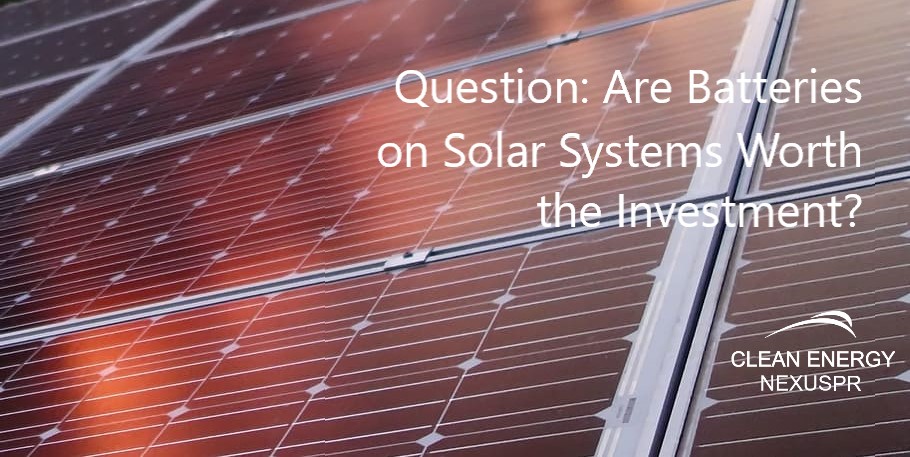Answer: It depends upon your reasons for installing solar.
Do you want to go green? Reduce your carbon footprint? Are you trying to hit a corporate green initiative? All wonderful reasons for investing in a battery storage solution, but not the main driver of demand for batteries.
Are you trying to save money on electricity? Are you concerned about intermittent electricity from the grid? Do you live in an area where you may experience an extreme weather event that will take down your electric utility? These reasons are more likely to receive a resounding YES, a battery storage system is worth investing in.

Batteries are a newer component to solar systems and are useful if your solar system produces more electricity during peak times than you can consume.
They're also a fantastic complement to an electric vehicle that charges at night (when solar panels aren't producing electricity) and can be a lifesaver if your business needs uninterrupted electricity and electricity from the grid is unexpectedly disconnected. They're a great alternative to buying electricity on cloudy days when solar panels aren't producing electricity, and they bring peace of mind to business owners and those who rely on electricity to run coolers that keep product frozen or cold, or to provide a necessary service during a power outage such as run hospital equipment or pump gasoline.
The Inflation Reduction Act of 2022 was passed into law on August 16th 2022 when President Biden signed the bill (H.B. 5376). It bumped up the previous 26% Investment Tax Credit (ITC) for solar and batteries to 30%, effective immediately, which is great news for anyone looking into going solar.
Before the bill was passed into law, batteries had to derive 100% of their energy from solar. This is no longer the case, and all batteries are eligible for the 30% ITC now. This is great news for companies looking into pairing electric vehicle charging stations with solar arrays that meet most, but not all, of their potential needs.
Battery storage systems solve a lot of problems, and are going to become more and more prevalent as a part of solar energy installations and in other applications.
Rather than purchase costly, diesel-fueled, high-maintenance generators as a backup solution when the power goes out, companies are going to be installing solar power generation systems on their roof, parking canopies, and on the ground tied directly to their battery storage, which can be programmed to power critical business components only in the event of a loss of grid power.
They can also be used to store excess electricity made by the solar array during peak times, and power up electric vehicles or equipment off-peak, or when the panels aren't producing electricity.
Many of the credits from the government granted through the Inflation Reduction Act are dependent upon the purchase being manufactured, at least in part, in the USA. Many battery storage system parts have previously been manufactured in China, and the push to create more American jobs in the solar industry is dependent upon American purchases being made in America.
A relevant recent study in supply and demand related to the supply shortage of new cars due to a ban on imported computer chip parts previously almost exclusively made in China, and the related temporary increase in demand for used cars, makes us wonder if there might be a related surge in temporary backup generators while the domestic supply increases.
Through the Inflation Reduction Act the domestic demand for battery storage systems will increase, and we're hopeful the demand and supply will balance each other out shortly and make battery storage systems a typical add-on to a solar energy system, rather than a luxury.
Photo credited to DepositPhotos.com
